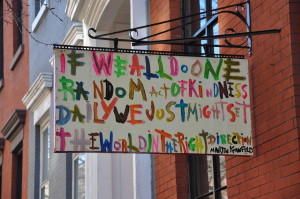 Kids emphasize achievement and personal happiness over kindness and fairness because we do.
Kids emphasize achievement and personal happiness over kindness and fairness because we do.
So exactly how are we faking our kids out — claiming we care about certain values that support the common good but instead prizing other values that benefit the individual first and foremost?
Researchers say it’s in not-so-subtle and more subtle ways: When we argue with teachers for better grades, harangue coaches for more field time for our kid, don’t require our kids to reach out to a friendless child on the playground, or when we cater to our child’s every need so that — surprise, surprise — she has difficulty showing concern for anyone other than herself. Ouch.
To a certain degree, some of the study’s results are a reflection of our economic and cultural times and the academic pressures kids face today, Weissbourd said.
“I have to lie to kids here about my [low] GPA so they won’t look down on me,” reported one youth.
“I’m tempted to gloat to the person next to me when I get a good grade rather than help them understand,” said another.
In addition, over 60 percent ranked hard work above kindness. The numbers correspond with other research that shows a large percentage of students report that they’ve cheated on tests or homework and feel huge pressure to do well academically.
But wait a minute — what’s wrong with hard work? Many parents would proudly say that value that ethic, and those of personal achievement and happiness.
Hard work is an admirable value and an important ingredient to success, these researchers say. But they are want us to remember that fairness is key to a healthy society.
Researchers point out what might be obvious but easily forgotten: Caring for others, and prioritizing personal values like altruism and fairness, actually does make people happy.
And there is an opposite irony, they state in the report: “The intense focus on achievement and happiness can make children not only less caring, but also less happy.”
Not all altruism is learned behavior, Weissbourd said. “To some degree we are all born with a certain degree of empathy. But in other ways it’s like learning an instrument or a sport: If you practice and have guidance from adults, you can get better as you go and build those routines.”
So how do we course-correct?
First, take heart. Youth still did value kindness and fairness even if it wasn’t at the top of their list.
“I like to help others. Sometimes I help others to the point where I don’t even get enough time to help myself; however, it makes me feel good inside to know that someone who is struggling has less on their shoulders,” another said.
The big goal is for kids to have some moral identity or ethical identity, Weissbourd said; for the fact of being a good person to feel like it’s “in their bones.” Some researchers educators call it being a “first responder” — “agents of change, who have the capacity to swoop in and be healing, nurturing, supporting to others.”
Weissbourd’s team at Harvard’s Making Caring Common project gives us these guidelines:
Children and youth need ongoing opportunities to practice caring and helpfulness, sometimes with guidance from adults.
Daily repetition — whether it’s helping a friend with homework, pitching in around the house, having a classroom job, or working on a project on homelessness—and increasing challenge make caring second nature and develop and hone youth’s caregiving capacities.
Children and youth need strong moral role models.
Being a role model doesn’t mean that we need to be perfect or have all the answers. It means grappling with our flaws, acknowledging our mistakes, listening to our children and students, and connecting our values to their ways of understanding the world.
Children need to be guided in managing destructive feelings.
Often the ability to care for others is overwhelmed by anger, shame, envy, or other negative feelings. We need to teach children that all feelings are ok, but some ways of dealing with them are not helpful.
Other ideas…
- Talk to your kids about social justice and injustices.
- Pose ethical and philosophical dilemmas and queries and discuss/debate them as a family.
- Explore questions of right and wrong that come up in your family, in movies and in books.
Read Part 1 of the series here. This story originally was originally published by ParentMap.
By Natalie Singer-Velush
In between school drop-offs and coffee binges, Natalie is ParentMap’s Managing Editor. Follow her! In her former life Natalie wrote for newspapers and once pumped milk in the bathroom of the King County Superior Courthouse while covering a murder trial. Natalie is Canadienne via California and now lives in Seattle with her husband and two school-aged daughters. She likes cool sheets, cupcakes, tall men and obedient children.
Photo by Heath Brandon.





